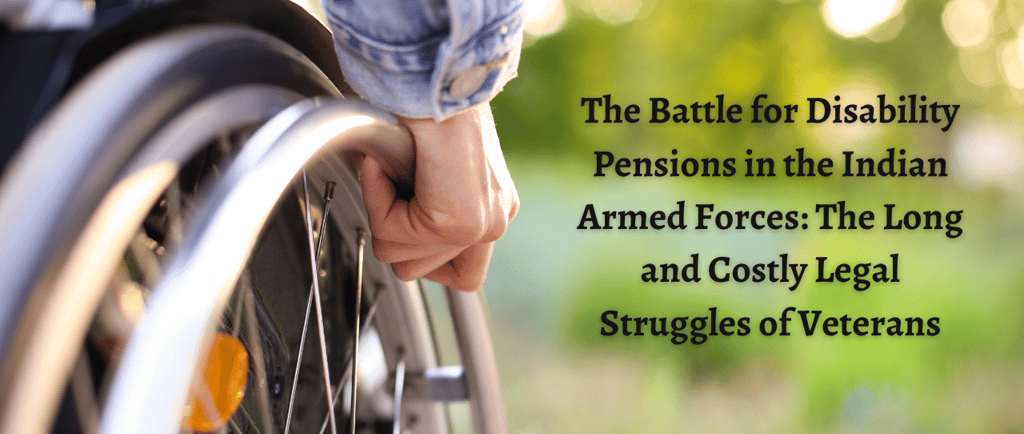The Battle for Disability Pensions in the Indian Armed Forces: The Long and Costly Legal Struggles of Veterans


The Battle for Disability Pensions in the Indian Armed Forces: The Long and Costly Legal Struggles of Veterans
For thousands of Indian Armed Forces personnel, the end of their active duty is supposed to be the beginning of a well-deserved period of peace and stability. Yet for many disabled veterans, this transition becomes a drawn-out legal struggle as they face the challenge of securing disability pensions. Despite the lifelong sacrifices these soldiers have made, the path to obtaining disability benefits often requires extensive and costly court battles that drain their savings and test their resolve. For those coming from economically disadvantaged backgrounds, the pursuit of justice can seem nearly impossible.
Understanding the Legal Journey for Disability Pension
When a veteran is denied a disability pension, their recourse typically lies in taking the case to court. Most claims are filed in the Armed Forces Tribunal (AFT), which was created to address grievances from service members. Yet, even here, veterans find themselves in a system where cases often drag on for years. Legal battles involve proving the severity and service-related nature of the disability, requiring substantial documentation and often multiple appeals against initial rejections.
Moreover, veterans must frequently go through additional hearings, assessments, and expert consultations to substantiate their claims. Each layer adds time and complexity to the process, making it common for cases to remain unresolved for years. And this delay is especially punishing for older veterans or those with progressive or chronic health conditions, who may need funds immediately to manage their day-to-day health and expenses.
High Legal Expenses: A Crushing Burden for Veterans
Court cases, even in the Armed Forces Tribunal, are expensive. For veterans from humble backgrounds, the legal fees, travel expenses, and court-related costs are often overwhelming. Hiring legal representation is typically necessary to navigate the complex nature of disability pension cases. Many veterans pay high fees to lawyers who specialize in military cases, but even with this expertise, delays in the legal process are common.
With every new filing, court appearance, or appeal, veterans incur additional expenses, with little guarantee of a successful outcome. In many instances, veterans from rural areas or low-income families are forced to take on debt or use up their savings to fund these legal battles, adding financial hardship to their physical challenges.
Social and Financial Strain on Families
For veterans who lack substantial financial backing, the pressure of these court cases quickly spills over to their families. Many of these families are already supporting a disabled individual who may need regular medical care, mobility aids, or therapy. The costs of managing the legal battle further stretch limited resources, leading families to make difficult choices about cutting back on essential needs to support the legal process.
Family members, particularly spouses, often end up bearing a dual burden—providing care while navigating legal formalities and balancing household expenses. In the case of younger veterans with families, this can mean a reduction in educational or career opportunities for their children, as family resources are drained by the costs of the legal fight.
Physical and Emotional Toll of the Legal Battle
The process of attending hearings, revisiting military records, undergoing multiple medical assessments, and waiting for rulings can take a heavy toll on veterans' mental and physical health. For those suffering from PTSD, mental health conditions, or physical disabilities, revisiting service-related injuries in the courtroom can be emotionally exhausting.
Moreover, the length of these legal proceedings means that, in some cases, veterans pass away before a decision is reached. Families are then left to continue the battle on their behalf, enduring the painful process of seeking posthumous recognition and benefits. This ongoing struggle only adds to their emotional burden and, tragically, often erases the sense of closure for families who have already lost their loved ones.
Conclusion
The current system of securing disability pensions through court battles places an unfair and heavy burden on veterans of the Indian Armed Forces, particularly those from low-income backgrounds. Veterans should not have to fight another battle in the courts after sacrificing so much for their nation. These prolonged legal cases drain their resources, energy, and well-being—essentially penalizing them for their service.
Implementing more efficient and compassionate processes could ensure that veterans receive the recognition and support they deserve, allowing them to live their post-service years with dignity, rather than in the relentless pursuit of their rights. A commitment to systemic change in this regard would honor the sacrifices of India’s Armed Forces personnel and uphold the nation’s promise to stand by those who have served it faithfully.